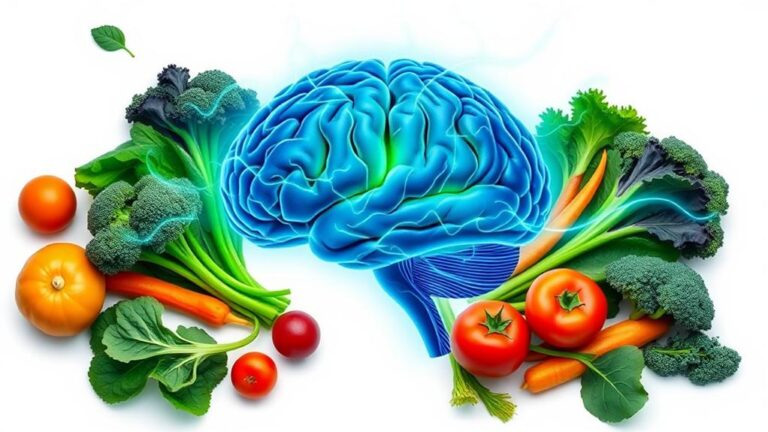Imagine your body as a finely tuned engine, ready to burn fuel efficiently. If you've been considering a low carb diet, you might be surprised at how this approach can reshape your weight loss journey. From enhanced fat burning to improved mental clarity, the benefits are compelling. But what does that really mean for your daily life and long-term goals? Let's explore how these advantages can pave the way for a healthier, more sustainable lifestyle.
Enhanced Fat Burning
One of the standout benefits of a low carb diet is its ability to enhance fat burning. When you reduce your carbohydrate intake, your body shifts from using glucose as its primary fuel source to burning fat for energy. This metabolic shift not only helps you shed pounds but also encourages your body to tap into stored fat, leading to more effective weight loss.
Ketosis is the ultimate goal of this process, where your body becomes highly efficient at burning fat for fuel.
As you cut down on carbs, insulin levels drop, which helps increase fat oxidation. Lower insulin levels mean your body is less likely to store fat and more likely to utilize it for energy. You'll find that your body becomes more efficient at burning fat, especially during workouts.
Additionally, a low carb diet often leads to lower blood sugar levels, which can stabilize your energy and reduce fatigue. You might notice that you feel more energetic throughout the day, allowing you to engage in physical activities that further promote fat loss.
Reduced Hunger Levels
Shifting to a low carb diet not only boosts fat burning but also helps reduce hunger levels. When you cut back on carbs, your body shifts to using fat for fuel, leading to more stable energy levels throughout the day. This stability can help you feel fuller for longer, minimizing those pesky hunger pangs that often derail your weight loss efforts.
Keto food essentials like high-fat foods and protein sources contribute to this increased satiety, making it easier to adhere to the diet.
Many people find that they experience fewer cravings when following a low carb diet. Since carbs can spike your blood sugar levels, reducing their intake helps prevent the rapid drops that typically leave you feeling hungry again shortly after eating.
By focusing on protein and healthy fats, you'll not only feel satisfied after meals but also find it easier to resist snacking between them.
Moreover, the satiety provided by high-protein and high-fat foods can make meal planning simpler and more enjoyable. You won't constantly be worrying about what to eat next or fighting off the urge to snack.
This newfound control over your hunger can be a game changer, making your weight loss journey smoother and more sustainable. So, embrace the low carb lifestyle and enjoy the benefits of reduced hunger.
Improved Blood Sugar Control
Over time, many people on a low carb diet notice a significant improvement in their blood sugar control. This is essential, especially for those managing diabetes or prediabetes. By reducing carb intake, you lower the amount of glucose entering your bloodstream. This helps your body maintain steadier insulin levels, avoiding the spikes and crashes that often accompany high-carb diets.
Here's a quick overview of how a low carb diet can affect your blood sugar:
| Benefit | Explanation | Result |
|---|---|---|
| Reduced Blood Sugar Spikes | Fewer carbs mean less glucose in your system. | More stable blood sugar levels. |
| Improved Insulin Sensitivity | Your body becomes more effective at using insulin. | Lower risk of insulin resistance. |
| Lower HbA1c Levels | Consistently low blood sugar levels can reduce HbA1c. | Better long-term blood sugar control. |
| Enhanced Overall Health | Lower blood sugar can lead to reduced inflammation. | Improved overall well-being. |
Increased Energy Levels
Many people experience increased energy levels when they switch to a low carb diet. This boost often stems from the body's shift in fuel sources. Instead of relying on glucose from carbs, your body begins to burn fat for energy, leading to more consistent and sustained energy throughout the day.
You might find that you no longer experience the mid-afternoon energy crashes that can come with high-carb diets. This process, known as ketosis, is a key feature of the ketogenic diet and can contribute to improved brain function and reduced inflammation.
When you eat fewer carbs, you also stabilize your blood sugar levels. This stability prevents the spikes and drops in energy that can leave you feeling sluggish and fatigued.
You'll likely notice that you can maintain focus and tackle tasks with greater efficiency, thanks to this newfound energy.
Additionally, a low carb diet can enhance your physical performance. With more fat available as fuel, you may find it easier to power through workouts, whether you're lifting weights or going for a run.
As your body adapts to this way of eating, you'll likely feel lighter and more energetic, making it easier to stay active and engaged throughout your day. Embracing a low carb lifestyle may just be the key to revealing your full energy potential.
Better Mental Clarity
Improved mental clarity is one of the standout benefits of a low carb diet. When you cut down on carbohydrates, your body shifts to burning fat for fuel, producing ketones. These ketones have been shown to enhance brain function considerably. You might notice that you can focus better, think more clearly, and make decisions with greater ease.
Many people experience fewer brain fog episodes, which often accompany high-carb diets. By reducing sugar intake, you stabilize your blood sugar levels, preventing the spikes and crashes that can lead to irritability and distraction. Instead, you'll enjoy sustained energy, allowing you to concentrate on tasks for longer periods without losing focus.
Additionally, a low carb diet encourages the production of neurotransmitters, which play an essential role in mood regulation and cognitive function. You might find yourself feeling more motivated and engaged in your activities, whether at work or during your leisure time.
Preserved Muscle Mass
One of the key advantages of a low carb diet is its ability to help preserve muscle mass while promoting fat loss. When you reduce carbohydrate intake, your body shifts to utilizing fat as its primary energy source. This metabolic change encourages your body to tap into fat stores for energy, which means it doesn't have to break down muscle for fuel.
In a caloric deficit, many diets lead to muscle loss as your body seeks energy. However, a low carb diet allows you to maintain higher protein levels, which is essential for muscle preservation. When you consume adequate protein, your body has the necessary building blocks to repair and maintain muscle tissue. This is critical, especially if you're incorporating strength training into your routine.
Additionally, the preservation of muscle mass plays a significant role in your overall metabolism. Muscle tissue burns more calories at rest compared to fat tissue.
Simplified Meal Planning
Maintaining muscle mass on a low carb diet not only supports your fitness goals but also simplifies your meal planning. By focusing on high-protein, low-carb foods, you can quickly create a variety of meals without the hassle of complicated recipes. This streamlined approach allows you to spend less time in the kitchen and more time enjoying your meals.
Here's a simple meal plan to get you started:
| Meal | Food Choices |
|---|---|
| Breakfast | Scrambled eggs & spinach |
| Lunch | Grilled chicken salad |
| Snack | Greek yogurt with almonds |
| Dinner | Baked salmon with asparagus |
| Dessert | Dark chocolate (in moderation) |
Conclusion
In the grand symphony of weight loss, a low carb diet plays a harmonious tune of benefits that can transform your journey. By embracing enhanced fat burning and reduced hunger, you'll find yourself dancing through your days with increased energy and mental clarity. With every meal simplified, you're not just shedding pounds but crafting a lifestyle that preserves your hard-earned muscle. So, why not take the leap? Your body's waiting for a change that sings to the rhythm of health.



